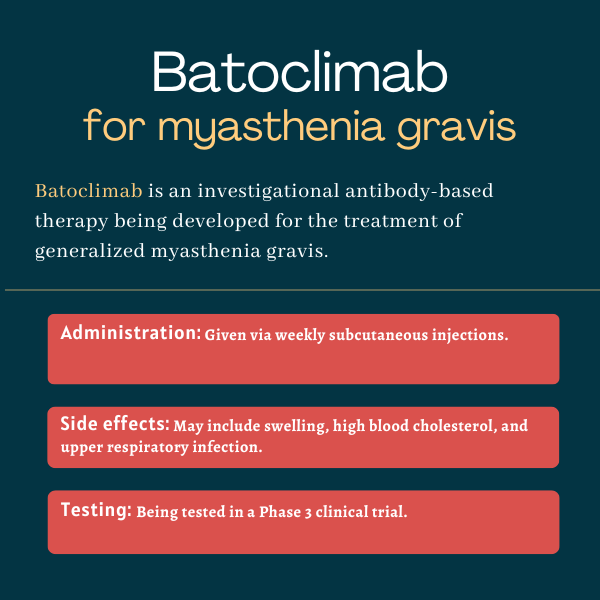Batoclimab for myasthenia gravis
Last updated Sep. 5, 2024, by Lindsey Shapiro, PhD

What is batoclimab for myasthenia gravis?
Batoclimab is an experimental antibody therapy being developed for treating a number of autoimmune diseases, including generalized myasthenia gravis (gMG). Belonging to a class of therapies called FcRn blockers, the under-the-skin, or subcutaneous, treatment is designed to lower levels of disease-causing antibodies in order to ease disease severity.
While batoclimab was first developed by HanAll BioPharma, Immunovant is now developing it for eventual commercialization in the U.S. and Canada. Harbour BioMed holds the license to commercialize the therapy in Greater China, where it’s under regulatory review.
Batoclimab has been known by other names, including HBM9161, HL161, RVT-1401, and IMVT-1401. It’s also being developed for treating chronic inflammatory demyelinating polyneuropathy, Grave’s disease, and thyroid eye disease.
Therapy snapshot
| Treatment name: | Batoclimab |
| Administration: | Being tested in myasthenia gravis as subcutaneous injections |
| Clinical testing: | In Phase 3 clinical testing |
How does batoclimab work in myasthenia gravis?
In myasthenia gravis (MG), self-reactive antibodies attack proteins important for the function of the neuromuscular junction, the region where nerve and muscle cells meet and communicate. Impairments in the function of the neuromuscular junction lead to the progressive muscle weakness and fatigue that characterize MG.
MG-causing antibodies belong to a class of antibodies called immunoglobulin G, or IgG. Batoclimab is an antibody-based therapy that’s designed to block the interaction between the neonatal Fc receptor (FcRn) protein and IgG antibodies. That interaction normally helps prevent IgGs circulating in the bloodstream from being degraded. By blocking FcRn, batoclimab increases the rate at which IgG antibodies, including the ones that drive MG, are broken down and removed from the bloodstream.
By lowering levels of self-reactive antibodies, batoclimab should ease MG symptoms and overall disease severity.
How will batoclimab be administered in myasthenia gravis?
In clinical trials, batoclimab is being administered via subcutaneous injections, typically given once a week at doses of 340 mg or 680 mg.
As clinical studies are still ongoing, the dosing regimen of batoclimab that would be used to treat gMG patients in clinical practice, should it be approved, hasn’t yet been determined.
Batoclimab in myasthenia gravis clinical trials
Immunovant and Harbour BioMed sponsored Phase 2 studies that tested the safety and preliminary efficacy of batoclimab in adult MG patients. Their results generally indicated batoclimab was safe and capable of lowering levels of circulating IgGs. Results also indicated the therapy could ease disease severity.
Batoclimab is now in Phase 3 clinical testing, where its efficacy is being evaluated in larger groups of gMG patients.
Phase 3 trial in China
Harbour BioMed sponsored a now completed Phase 3 trial (NCT05039190) in China that tested batoclimab’s efficacy against a placebo in 132 adults with gMG. For the first therapy cycle, the participants received six weekly injections of 680 mg of batoclimab or a placebo over five weeks and were then followed off-treatment for four more weeks. After the first cycle, a second treatment cycle could be initiated based on clinical need. Participants continued on other standard gMG care during the trial.
The study’s main goal was to evaluate the percentage of patients positive for disease-causing antibodies against acetylcholine receptor (AChR) or muscle-specific kinase (MuSK) proteins, the most common types of MG-causing antibodies, who achieved sustained reductions in disease severity during the first treatment cycle. That was defined as a reduction of at least 3 points on the MG Activities of Daily Living Scale (MG-ADL), a validated patient-reported measure of disease severity, that was sustained for at least four consecutive weeks during the cycle.
More than half of patients on batoclimab (58.2%) achieved this goal compared with nearly a third (31.3%) of those on placebo, with the difference being statistically significant. Differences between the two groups could be seen as early as two weeks into treatment.
Similar benefits of batoclimab over a placebo were observed with other scales of disease severity and life quality, including the Quantitative MG (QMG) scale, a clinician-rated measure of disease severity. In that metric, 64.2% of batoclimab-treated patients achieved a sustained response — also defined as a reduction of at least 3 points on the QMG score that was sustained for at least four consecutive weeks — compared with 40.6% of those in the placebo group.
Batoclimab also led to clinical benefits for most patients who underwent a second treatment cycle sometime during the study.
Participants who completed the main trial could then enter an open-label extension study (NCT05332210), where all were given cycles of batoclimab (680 mg) based on clinical need, with a dose reduction to 340 mg allowed if trial investigators deemed it necessary. The company has reported that long-term treatment continued to be safe and effective.
Ongoing trials
Immunovant is sponsoring a Phase 3 trial called FLEX (NCT05403541) that’s designed to confirm batoclimab’s safety and efficacy relative to a placebo in around 240 adults with mild to severe gMG.
In its first part, participants will be randomly assigned to receive weekly subcutaneous injections of batoclimab (340 mg or 680 mg) or a placebo for three months, with the main goal being to evaluate changes in MG-ADL scores among AChR antibody-positive patients. In a second, maintenance phase, batoclimab-treated patients will be re-randomized to receive a placebo or batoclimab (340 mg) once a week or every other week for another three months. The participants who respond to treatment may then enter a long-term extension treatment period. FLEX is expected to finish in 2025.

Common side effects of batoclimab
The most common treatment-related side effects of batoclimab in gMG clinical studies include:
- swelling
- high levels of fatty molecules, including cholesterol, in the bloodstream
- upper respiratory tract infection.
Myasthenia Gravis News is strictly a news and information website about the disease. It does not provide medical advice, diagnosis, or treatment. This content is not intended to be a substitute for professional medical advice, diagnosis, or treatment. Always seek the advice of your physician or other qualified health provider with any questions you may have regarding a medical condition. Never disregard professional medical advice or delay in seeking it because of something you have read on this website.
Recent Posts
- Working through myasthenia gravis, one story at a time
- Azathioprine eases MG symptoms, but does not extend survival: Study
- How studying history can help us navigate life with chronic illness
- Povetacicept reduces disease activity in MG mouse model
- The tug-of-war between my independence and his caregiving
Related articles






